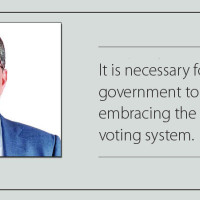- Wednesday, 11 February 2026
Cut Off Tentacles Of Corruption
Transparency International published the Corruption Perceptions Index (CPI)-2022 on January 31. The CPI is a report on perceived levels of public sector corruption recorded in 180 countries and territories. As per the report, Nepal was ranked 110th out of 180 positions with 34 points. The country was ranked 117th last year with 33 points. Although there was a slight improvement in the ranking, the level of corruption is more or less the same.
The CPI is a measure of corruption and calibrated from zero to 100, with 100 being a clean country and with zero being the most corrupt nation. A country with less than 50 points is considered to have rampant corruption. This year, the average score is 43 points. Two-thirds of the countries, including Nepal, have scored less than 43 points. This shows that many countries in the world are corrupt. This year, the score on the CPI has ranged from 90 points (for Denmark) to 12 points (for Somalia), showing Denmark as the cleanest country and Somalia as the most corrupt country. Denmark is followed by Finland with 87 points, while Somalia is followed by Syria and South Sudan both with 13 points.
Rampant corruption
Nepal is more corrupt than India and China. India is ranked 85th with 40 points, while China is ranked 65th with 65 points. In the SAARC region, the country is ahead of Pakistan (ranked 140th with 27 points), Bangladesh (ranked 147th with 25 points) and Afghanistan (ranked 150th with 24 points), while it is behind India, Bhutan (ranked 25th with 68 points), the Maldives (ranked 85th with 40 points) and Sri Lanka (ranked 101st with 36 points).
The CPI report clearly shows that Nepal is among the highly corrupt countries. As per the CPI report, corruption is rampant in the three important organs of the state: the executive, legislative and judiciary. Besides, corruption is rampant in security agencies, public offices and the private sector. In fact, corruption is widespread here, there and everywhere.
Corruption is the enemy of development as it eats into the fabric of the rule of law and good governance. Corruption has many forms and manifestations. It can be monetary or non-monetary. Bribery, embezzlement, fraud and extortion are the main forms of corruption. Such forms are rampant in Nepal. Further, nepotism and favouritism are also rife in the country.
Social norms and values are degenerating in Nepal. Most of those in power or authority are selfish. They think about their self-interests only. Their mission in life is to make money by hook or by crook. The main contributory factors responsible for rising corruption in the country are political protection, impunity and leniency towards the perpetrators of corruption despite the existence of anti-corruption mechanisms in the form of anti-corruption laws such as the Corruption Prevention Act, 2002 and the Commission for the Investigation of Abuse of Authority (CIAA), 1991.
The bail system is also responsible for growing corruption in Nepal. Those who embezzle tens of millions or billions of rupees are released on a meagre bail amount until a final verdict. But an inordinate delay in issuing the final verdict gives relief to the perpetrators. This may encourage people to indulge in corruption. Corruption has become a global phenomenon. A corrupt government cannot protect its people, more so when the country is in a crisis. Corruption stymies democracy and democratic institutions. It erodes social norms and values. It affects justice, equality and egalitarianism and endangers accountability, transparency and good governance. The rule of law also crumbles under the juggernaut of corruption.
The resources earmarked for development projects are diverted from such projects, only to go down the plug hole, favouring a handful of corrupt people. Corruption is also responsible for delay in the completion of development projects. The then Oli government publicised the Prosperous Nepal, Happy Nepali slogan when it was in power. Although the then Prime Minister, KP Sharma Oli, said that he would not look at the faces of corrupt people, his government did not take any measures to control corruption. Rather, corruption increased to the dismay of the people.
Prime Minister Pushpa Kamal Dahal Prachanda, while assuming the reins of government, vowed, among other things, to eliminate corruption. This is a good gesture on the part of the government. Nepal has corruption control mechanisms in place – punitive and correctional measures. Punitive measures are concerned with criminal justice. The government should prioritise anti-corruption commitment, maintain the right to information and free society of corruption and other anomalies. The CIAA should also be strengthened and made independent by making non-political but competent appointments. That a former commissioner of the CIAA is facing corruption charges is a matter of shame.
Ending impunity
More importantly, the government should end impunity and do away with political protection. The judiciary should be improved. If possible, the bail system should be eliminated. When those in judicial custody are out on bail, they may commit the crime again and even destroy the evidence against them. Worse, once a perpetrator is out on bail, the final verdict may never come out. So being released on bail may be as good as being declared innocent. This means justice is exchanged for bail involving a small amount of money vis-à-vis the money embezzled.
The Office of the Auditor General points out irregularities in government offices and urges the ministries concerned to settle them. But such instructions are hardly followed. As such, irregularities and anomalies in government offices are rising year after year. Corruption is a chronic malady in Nepal. One of the major factors for the country remaining undeveloped despite having abundant natural resources and receiving foreign aid and grants is corruption. As long as there is corruption, the country cannot make adequate headway in development. To nip corruption in the bud, initiative at the government level is a must.
(Maharjan has been regularly writing on contemporary issues for this daily since 2000.)
















